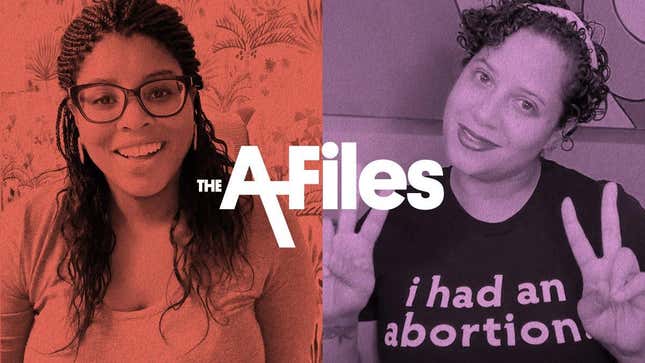Two Best Friends Made a Podcast About Their Abortions and It’s Eye-Opening Fun
The Nation’s Regina Mahone and We Testify’s Renee Bracey Sherman love to chat about abortion. Now you can listen and learn from them both on The A Files.
Entertainment

In 2022, Renee Bracey Sherman, executive director of We Testify, and Regina Mahone, a long-time abortion reporter and senior editor at The Nation, began co-writing their forthcoming book Liberating Abortion. But working up against page count limitations predictably sucked, Bracey Sherman told Jezebel; there was too much to include and they would spend hours just talking about all things abortion. Then, according to Bracey Sherman, Cindi Leive, co-founder of The Meteor “heard us bantering” about the topic, “asked if we ever thought about starting a podcast about abortion,” and the idea was born.
Initially, Bracey Sherman—whose organization We Testify helps people tell their abortion stories—wanted to call their podcast Everything You’ve Been Told About Abortion Is a Lie. They wound up going in a different direction, calling it The A Files: A Secret History of Abortion instead. But the truth-telling, myth-busting objective of the original title remains. On The A Files, which airs its fifth episode this week, Bracey Sherman and Mahone share their own abortion stories while exploring a different topic—and, often, misconception—related to abortion.
In an episode from January, Bracey Sherman and Mahone dispelled the idea that abortion is readily available in all “blue” states. This week, they talk to abortion researcher Dr. Gretchen Sisson about her new book Relinquished and the dark realities of the adoption industry, as well as the history of how adoption became propped up as a supposed “alternative” to abortion.
Obviously, the state of abortion rights in the U.S. is fairly bleak right now, and some of the revelations Bracey Sherman and Mahone deliver will leave you even more outraged. But throughout, their chemistry keeps The A Files an enjoyable, refreshing listen from start to finish. “When we’re talking about abortion, we’re talking about some of the most important moments of our lives—it’s very intimate in that way. How can you not do this work with the people you love?” Bracey Sherman said, calling Mahone one of her closest friends. The podcast is as informative as it is fun, with the friends sharing stories of DM’ing their city council members (and, at least once, getting results), riffing off the mainstream pro-choice movement’s obsession with The Handmaid’s Tale (which inspired their weekly “There Are Other Books” segment), and generally breaking down movement politics through an entertainingly unfiltered lens.
-

-

-

-

-

-

-

-

-

-

-

-

-

-

-

-

-

-

-

-

-

-

-

-

-

-

-

-

-

-

-

-

-

-

-

-

-

-

-

-








































